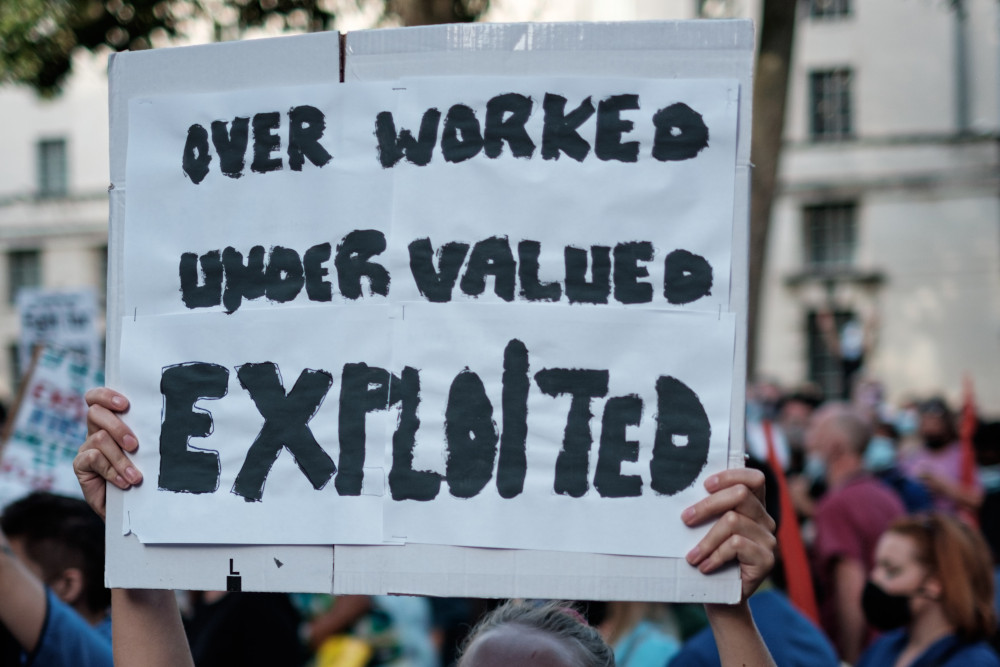
(Unsplash/Ehimetalor Akhere Unuabona)
Last week, the lower chamber of the Michigan legislature approved two bills that would repeal that state's "right-to-work" law. Control of both chambers of the legislature flipped to the Democrats last November, allowing them the chance to overturn the anti-union legislation which was signed into law by Republican Gov. Rick Snyder in 2012, when the GOP controlled the state legislature.
The misnamed "right-to-work" laws actually enshrine a "right-to-freeload," permitting workers to benefit from the work a union does for them without paying dues or contributing to the costs of negotiating contracts and working with management to guarantee a safe workplace. No one, in a free country, should be forced to join a union, but why should some people be able to make others pay for the kind of things unions provide to all the workers at a given facility? Needless to say, corporate interests and ideological libertarians support "right-to-work" laws.
Advertisement
In an essay in The New York Times magazine last week on the persistence of poverty, sociologist Matthew Desmond wrote, "The primary reason for our stalled progress on poverty reduction has to do with the fact that we have not confronted the unrelenting exploitation of the poor in the labor, housing and financial markets." He noted that inexorable forces like deindustrialization and globalization are often blamed for the problems of the poor and working poor. "Belgium and Canada and many other countries haven't experienced the kind of wage stagnation and surge in income inequality that the United States has. Those countries managed to keep their unions. We didn't."
Later in the same piece, Desmond writes:
As workers lost power, their jobs got worse. For several decades after World War II, ordinary workers' inflation-adjusted wages (known as "real wages") increased by 2 percent each year. But since 1979, real wages have grown by only 0.3 percent a year. Astonishingly, workers with a high school diploma made 2.7 percent less in 2017 than they would have in 1979, adjusting for inflation. Workers without a diploma made nearly 10 percent less.
Neo-liberalism — usually called neo-conservativism in the U.S. context — promised that tax cuts for the entrepreneurial class would trickle down to workers and that a rising tide would lift all boats. Both promises were false.
Unions do more than help strengthen the economy for average people and poor people. They are fonts of solidarity in a society drowning in libertarian myths. They are bridges in our polarized culture, uniting conservative members of the building trades with progressive members of the nurses' unions. It is for all these reasons that the Catholic Church, from the papacy on down, has supported labor unions.
As Pope Benedict XVI wrote in Caritas et veritate:
Through the combination of social and economic change, trade union organizations experience greater difficulty in carrying out their task of representing the interests of workers, partly because Governments, for reasons of economic utility, often limit the freedom or the negotiating capacity of labour unions. Hence traditional networks of solidarity have more and more obstacles to overcome. The repeated calls issued within the Church's social doctrine, beginning with Rerum Novarum [60], for the promotion of workers' associations that can defend their rights must therefore be honoured today even more than in the past, as a prompt and far-sighted response to the urgent need for new forms of cooperation at the international level, as well as the local level. (#25)
I couldn't have said it any better myself!
Unions do more than help strengthen the economy for average people and poor people. They are fonts of solidarity in a society drowning in libertarian myths.
Which is why it is baffling that the Michigan Catholic Conference has so far been AWOL on the effort to repeal that state's "right-to-work" law. A press inquiry to the conference on March 13 about the issue was not immediately answered. There is nothing on their website, even though there is a post remarking about their lobbying on three other issues: religious exemptions from a civil rights bill, in favor of a gun safety measure, and against a bill that would overturn the state's legal restrictions on abortion. Lobbying is all about multitasking so the decision not to support the repeal effort is, at best, baffling.
In 2021, the Catholic Church in New Hampshire played a pivotal role in beating back a right-to-work law in that state. Robert Dunn, the director of public policy for the Diocese of Manchester, which covers the entire state, lobbied the state legislature at a critical moment. A labor leader in the Granite State told me at the time that they thought the law was going to pass but that the intervention by the Catholic Church was critical in stopping the measure.
"Since the late 19th century, the Roman Catholic Church has supported the right of workers to band together in free trade unions for the purpose of bargaining with employers," Dunn wrote in a letter to legislators. "If the dignity of work is to be protected, then the basic rights of workers, owners, and other must be respected — the right to productive work, to just wages, to organize and choose to join a union, to economic initiative, and to ownership and private property. Workers, employers, and unions should not only advance their own interests but also work together to advance economic justice and the well-being of all."
The New Hampshire intervention built upon the work of the U.S. Conference of Catholic Bishops which issued an amicus curiae brief in a right-to-work case, Janus v. AFSCME, in 2018. Some conservative commentators objected to the U.S. bishops' brief, but supporting the right to organize is the Catholic social doctrine equivalent of a black letter law.
Why, when the teaching of the Catholic Church is so clear, is the Catholic Church in Michigan — of all places — doing nothing to support the workers of that state achieve rights the Catholic Church has long upheld?








